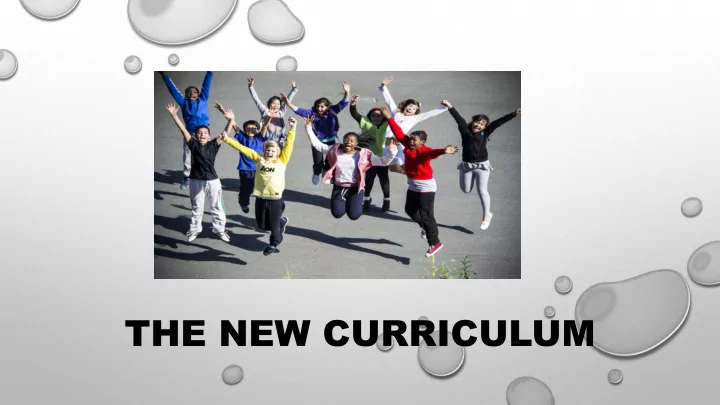

THE NEW CURRICULUM
THE NEW NATIONAL CURRICUL UM • 1988 – Education Reform Act brings in the first National Curriculum (along with GCSEs) • 2014 Curriculum focus on Excellence and Core Skills and more knowledge based • More ambitious end of year expectations • Do we have to do it? Yes
THE NEW NATIONAL CURRICULUM September 2014 New National Curriculum becomes statutory for all maintained schools (except in English, maths and science in Years 2 & 6) September 2015 New National Curriculum becomes statutory for all maintained schools in English, maths and science in Years 2 & 6
THE HEADLINES • All subjects remain •Core subjects very detailed, foundation subjects ‘light touch’ • Greater challenge – especially in maths •Focus on core knowledge and ‘nuts and bolts’ – phonics, SPAG, written algorithms, times tables, trees and animals of Britain, kings and queens, rivers and mountains… • ICT now computing – aimed at creating a new generation of computer scientists, getting children writing simple programs by the end of KS1 • Languages now statutory for KS2 – any language can now be taught (previous suggestion was just French, German, Italian, Spanish, Mandarin, Latin or Ancient Greek)
WHY THE CHANGE • Raising standards • More challenging and rigorous • Ensuring that children leave primary school secondary ready.
LITERACY • Stronger emphasis on vocabulary development, grammar, punctuation and spelling (for example, the use of commas and apostrophes will be taught in KS1) • Handwriting ( not currently assessed under the national curriculum) is expected to be fluent, legible and speedy • Spoken English has a greater emphasis, with children to be taught debating and presenting skills .
New Literacy Framework
MATHS • Five-year-olds will be expected to learn to count up to 100 (compared to 20 under the current curriculum) and learn number bonds to 20 (currently up to 10) • Simple fractions (1/4 and 1/2) will be taught from KS1 , and by the end of primary school, children should be able to convert decimal fractions to simple fractions (e.g. 0.375 = 3/8) • By the age of nine, children will be expected to know times tables up to 12×12 (currently 10×10 by the end of primary school) • Calculators will not be introduced until near the end of KS2, to encourage mental arithmetic.
I AM THINKING OF A NUMBER
SCIENCE • Strong focus on scientific knowledge and language , rather than understanding the nature and methods of science in abstract terms • Evolution will be taught in primary schools for the first time • Non-core subjects like caring for animals will be replaced by topics like the human circulatory system
ICT • Computing replaces Information and Communication Technology (ICT), with a greater focus on programming rather than on operating programs • From age five, children will learn to write and test simple programs, and to organise, store and retrieve data • From seven, they will be taught to understand computer networks, including the internet • Internet safety – currently only taught from 11-16 – will be taught in primary schools
AT NORTHWOLD It is important to distinguish between the National Curriculum and the wider school curriculum. There are a number of components of a broad and balanced school curriculum that should be developed on the basis of local or school-level decision making, rather than prescribed national Programmes of Study.’ As a result we aim to provide: • An enriched curriculum. • Balanced and Broadly Based • Promotes spiritual, moral, cultural mental and physical development • Prepare pupils for the opportunities, responsibilities and experiences of later life.
WHAT WE DO AT NORTHWOLD • Trips – linked to areas of the curriculum • Projects- Enabling Enterprise, Pop Up, Art • Enrichment activities- After school clubs, We Day event • Workshops- Unicorn Theatre, Anti-bulling, Cycle Training • Special Whole School Events- World Book Day
Northwold IPC Topic Planner 2014-2015 Autumn 1 Autumn 2 Enabling Spring 1 Spring 2 Enabling Summer 1 Summer 2 Enabling Bears Clothes Enterprise Patterns Treasure Enterprise Plant & Changes Enterpris Nursery Flowers e Family Let’s Shopping Animals Up and Transport Receptio n and Pretend Away Friends Sensational! Going The magic toymaker Gallery Time travellers Postal Year 1 (The Senses) Green (Toys and games) Opening (Significant events) Service People of the past Helping Buildings Imagining The circus is coming Doing Year 2 (Significant people) Others (Structures) Changes (Movement and Good entertainment) Chocolate Number Scavengers and settlers Mange Footprints from the past Trash to Year 3 (Food) Crunching (Early man to the Iron Age ) Tout (Before people) Treasure Saving the world Making Active planet Design Temples, tombs and Brilliant Year 4 (Rainforests) Changes (Earthquakes and volcanoes) Company treasures Books (Ancient civilisations: Egypt and Sumer) What a wonderful Active They see the world like this Constructi Great, bold and brave Going Live Year 5 world Minds (Artist impressions of on Counts (Classical civilisations: (The natural world) the world) Greece, Rome and beyond) Making the news Making Out of Africa SATS Number Moving Year 6 Big Year 6 (Print, broadcast and News (Evolution and Games people Celebration Business online journalism) inheritance) (Migration Unit Challenge )
WHAT YOU CAN DO AT HOME • SUPPORT YOUR CHILD IN COMPLETING THEIR HOMEWORK • DOWNLOAD EDUCATIONAL GAMES ON TABLETS, IPADS OR MOBILE PHONES • PLAY BOARD GAMES • LABEL DIFFERENT ITEMS IN THE HOUSE SO THAT YOUR CHILD CAN LEARN TO SPELL THEM • DISPLAY TIMES TABLES AROUND THE HOUSE
THANK YOU
Recommend
More recommend